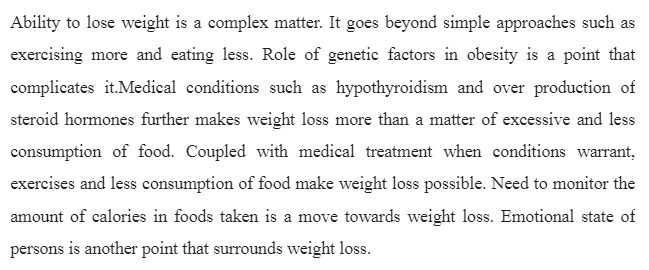Weight Control-For example, they have an increased risk of a variety of chronic illnesses, such as heart disease and diabetes. But there is also a fair amount of prejudice against those who are overweight or obese. This psychological bias may contribute to negative evaluations by others and low self-esteem on the part of the person who is overweight. The negative attitudes may exist because the culture seems to place a great deal of responsibility on the individual for his or her weight.
Just how much control do you have over your own weight? In this Discussion assignment, you will review the research regarding biological factors contributing to weight, metabolism, and BMI, and then reflect on the implications of this information for the treatment of obesity and the assumptions that our society seems to have about obesity.
To prepare for this Discussion:
Review the textbook’s coverage of hunger, eating, and obesity, paying special attention to biological factors that contribute to hunger, weight, rate of metabolism, and BMI.
Think about what this information suggests regarding the individual’s ability to control his or her weight, specifically the ability of those who are overweight to lose weight, or the ability of those who are of normal weight to remain so.
Consider what biological factors contribute to obesity and a person’s ability to control weight and what motivational factors come into play.
Think about what an obese person encounters in his or her experiences in the world, from employment possibilities to social experiences to self-worth and self-esteem issues. Do you think there is societal prejudice against obese people and, if so, how does that affect them?
With these thoughts in mind:
Post by Day 4 your position regarding the following statement: Everyone can control his or her weight; anyone who is currently overweight or obese should be able to lose weight by exercising more and eating less. Justify your position with pertinent research-based information from the textbook and other learning resources. Be sure to address biological factors in obesity and weight control as well as motivational factors as you explain and justify your position. Finally, do you believe that there is prejudice in this society against overweight and obese people and, if so, what is its effect? Explain or justify your answer with specific examples.
Be sure to support your postings and responses with specific references to the Learning Resources.
Read a selection of your colleagues’ postings.
Respond by Day 6 to at least one of your colleagues’ postings in one or more of the following ways:
Ask a probing question.
Share an insight from having read your colleague’s posting.
Offer and support an opinion.
Validate an idea with your own experience.
Make a suggestion.
Expand on your colleague’s posting.
Return to this Discussion in a few days to read the responses to your initial posting. Note what you have learned and/or any insights you have gained as a result of the comments your colleagues made.
Resources to use:
Course Text: Garrett, B. (2015). Brain and Behavior: An Introduction to Biological Psychology, (4th ed.). Los Angeles: Sage.
Chapter 6, “Motivation and the Regulation of Internal States” (pp. 159–195)
Chapter 7, “The Biology of Sex and Gender” (pp. 197–229)
A case study or research report from the Walden Library that discusses transgendered or transsexual individuals.
Web Site
Hunger, Satiation, and the Regulation of Fat Reserves (Brain and Behavior, Figure 6.7)
http://www.sagepub.com/garrettbb2study/animations/6.7.htm
This sequence traces the connections between body and brain that account for hunger, satiation, and the regulation of fat reserves
With these Learning Resources in mind, please proceed to the Discussion.
Answer Preview-Weight Control

